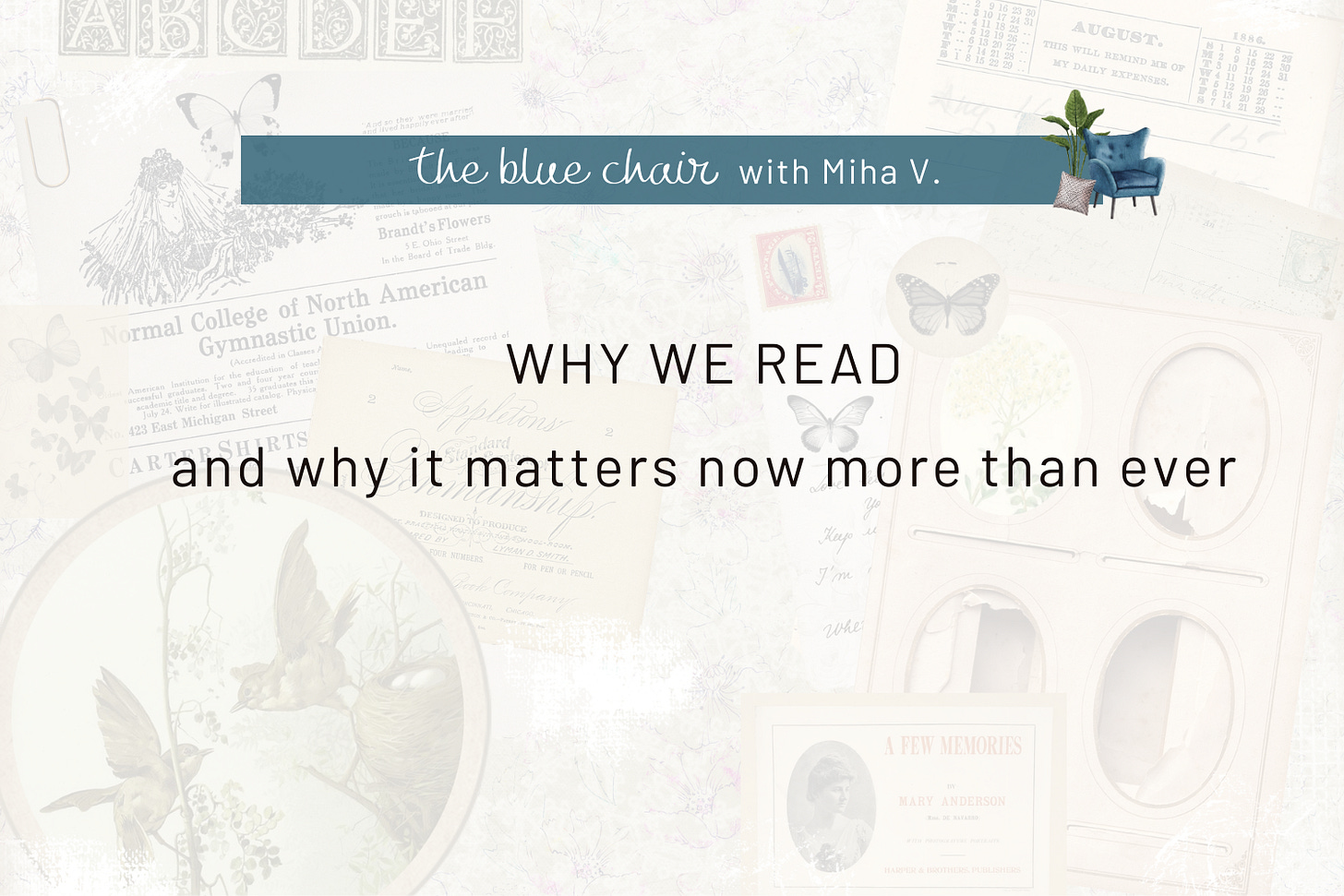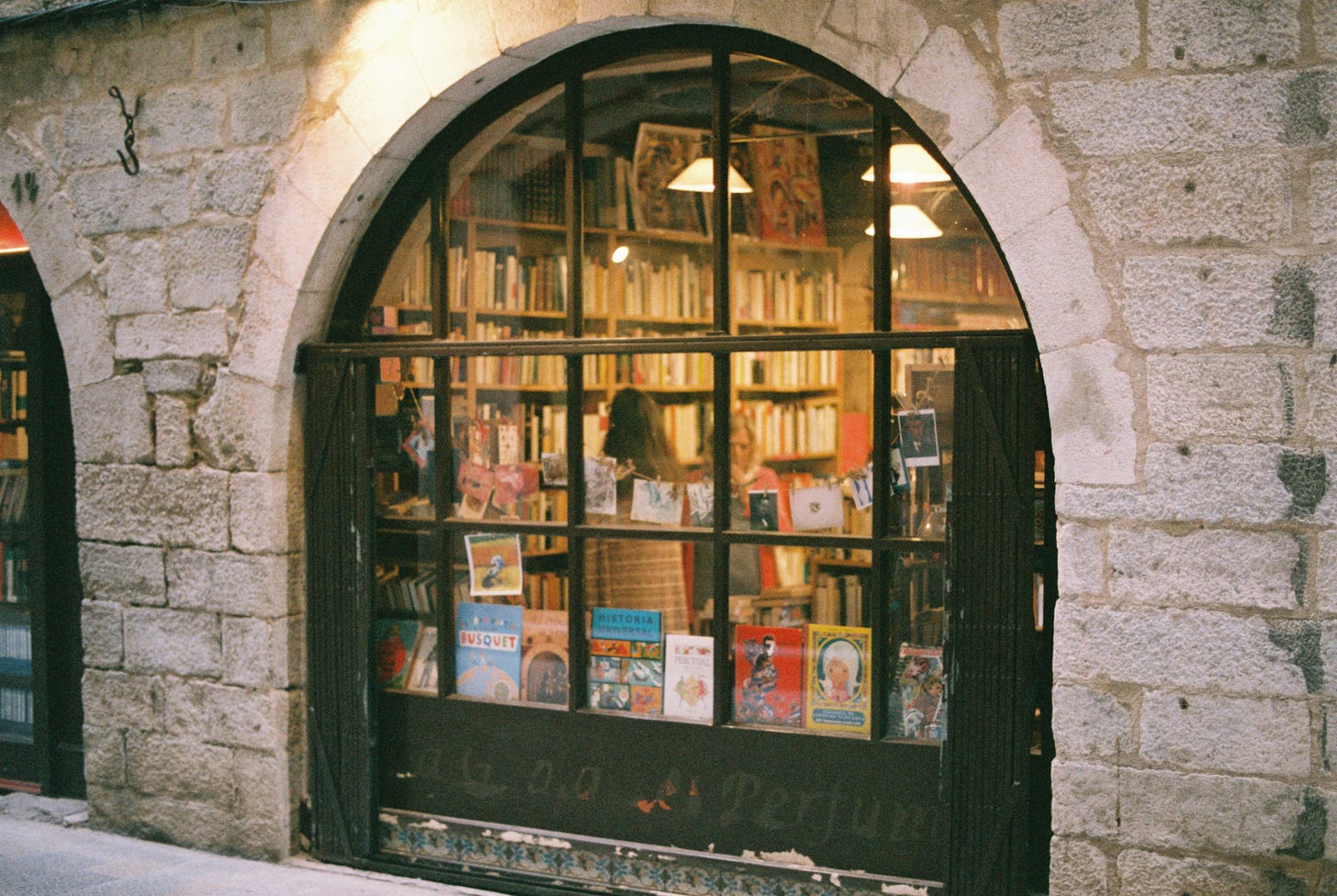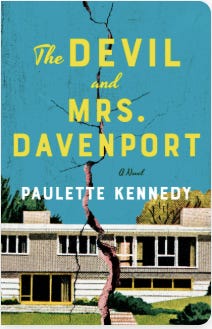Why we read, and why it matters more than ever
Books for self-exploration, healing, and soul reclamation
Do you ever feel that pull when you walk past a bookshop? That feeling that makes you stop, that tempts you to take a detour from your busy life and push the door open, wander through the bookshelves as your eyes eagerly look for your next read, your next treasure waiting patiently to be found by you.
What if there’s a reason for it? A reason why, even when life is full and fast and frazzled, the quiet company of a story still calls your name?
For many of us, reading is more than entertainment. It’s remembering to keep walking the path that brings us back to ourselves.
Shhh I’m reading…
We’ve been taught quietly and relentlessly to be useful. Helpful. Available. Our time has never fully felt like our own. Whether or not we have children, we often move through life stretched thin, our hours spoken for, our quiet cravings placed last.
Reading, then, can feel almost transgressive.
To sit down with a book is to say: This moment belongs to me. It’s not for service, not for productivity, not to fix or please or achieve. It’s just for me.
And that, in a world that rewards women who self-sacrifice, is a radical act of self-reclamation.
Reading doesn’t just occupy time, it expands it. Your books becomes a private world, a sanctuary. A place where your mind and emotions are allowed to stretch, wander, and awaken. Like tending to an inner garden no one else sees, it’s both soft and subversive.
And then, it’s about what we find inside these stories.
When we read, we invite other lives into our own. We open ourselves to different paths, new truths, old memories. And in the space between their story and ours, something shifts. A mirror appears. A truth lands. A knot unravels.
This is how women have always healed. Through stories. Around fires, in kitchens, in journals, in secret. Not through instruction, but through shared experience. Through deep listening. Through resonance.
Not every story will do this. But some (especially those that follow the heroine’s journey rather than the typical hero’s quest) carry a different kind of magic. They move in spirals. They honour emotion. They end not in conquest but in integration. And when we find one of these stories, something inside of us shifts.
A book lands differently than a movie
In a way, when we scroll on Instagram or TikTok or even watch Netflix, we’re often searching for the same thing as when we reach for a book.
We want to feel. To be moved. To connect.
But it doesn’t land the same way. Our screens have fast become another doorway for fast consumption. We’re passively being told stories and we feel emptier after. It’s going to McDonald’s when what you need is to be nourished at a soul level.
Movies and series can move us, yes. But reading asks something of us. It pulls us in with our full attention. It changes us in more lasting, nuanced ways. It’s a slow experience that requires your presence, your commitment. When you read a book, you say to yourself: I’m taking the time that I deserve. Not for a quick fix. Not for distraction. Not to numb. But to be with something.
It’s a week of living with the same characters, of letting their lives percolate into yours. You pause. You think. You reflect. You participate. You, the reader, become part of the story. You intertwine your life with theirs. And maybe, in some invisible way, with the author’s too.
That’s what makes reading such a powerful tool for self-healing and self-growth.
The stories we grew up with
As a kid, I grew up with my mother, and she wasn’t a reader.
We had a few books at home, mostly left behind by my dad before the divorce. Encyclopedias and destination guides.
My mother had books about losing weight, recipes, astrology, and how to make yourself pretty so men would find you irresistible. I promise I’m not making that up.
I was never told bedtime stories, but I had an older neighbour who bought me the entire collection of La Comtesse de Ségur, a classic French saga about a little girl who was far from perfect. She was jealous, disobedient, and cruel, and of course, the moral was clear: her misbehaviour led to tragedy, punishment, and misery.
Maybe your childhood was different.
Maybe you had stories with girls going on epic adventures, building communities, creating peace. But if you're a woman in midlife today like me, chances are your library was also quietly training you.
Even our books were teaching us to behave. Be kind. Be calm. Be quiet. Be pretty. Be in control of your emotions. Please your parents. Your stepmother. Your future husband.
Choosing now to read books about other women’s journeys, especially those that centre a heroine’s growth, is a way to rewrite that script.
To reconnect with the woman you are, beyond the roles. To say: I matter. My voice matters. My rage isn’t hysterical. My intuition is not silly. My life has worth even when I’m not serving someone else’s needs.
That is self-reclamation too: ditching the shame, the punishment, the relentless performance.
Letting yourself be a whole human, flawed and radiant and real.
When a book cracks you open: The Devil and Mrs. Davenport
I’ve read a lot of books in my life (I even studied literature at university) but I’m a fairly easy public, probably because I’m so empathetic. It doesn’t take much for a story to move me.
But some books do so much more than move us. They undo us.
One book that recently cracked me open is The Devil and Mrs. Davenport by Paulette Kennedy.
“It wasn’t the devil I feared. It was the way I had disappeared inside the life everyone expected of me.”
Set in 1950s small-town America, the story follows Loretta Davenport, a pastor’s wife who begins hearing voices and seeing visions. Quite rapidly, we understand that the devil in the story isn’t very much not in her imagination but right there under her roof. Her world starts to crumble, her house cracks open and then collapses, and with that her entire life is demanding her to burn it all to the ground and choose herself.
What it mirrored in my own life was the needed reminder to follow my own rules. Of course I’m not a woman in the 50s, and I’m happy to live in a happy marriage. But still, I find it constantly challenging to disobey the pressure in order to build a life on my own terms, to follow my creative urges, to reclaim time to pursue my own choices, my own intuition without having to listen to anyone else’s opinions on how my time on earth should be spent.
Sometimes, in order to be free, we have to let ourselves collapse. Surrender. Whether that’s through letting go of a job that sucking our soul, or escaping a marriage that’s been confining us to a teeny tiny spot. We need to stop contorting ourselves into the roles we were given. We need to stop trying to hold it all together because it was never ours to hold together.
Instead, it’s perfectly enough to just say “No, I’m not doing that anymore” … and walk away.
There’s so much courage in Loretta. On the outside, she may look docile. But inside, she knows. She always knows. That’s what’s so powerful. That deep knowing. That quiet refusal to betray herself.
And yes, that kind of clarity can make people angry.
Not just men, other women too, because you’re showing them a truth they’ve buried.
A sacred reading ritual
Reading for self-exploration is not just about which books you read, it’s also about how you meet them.
One of the most beautiful ways to bring more intention into your self-exploration is to create a reading ritual. This doesn’t have to be elaborate, in fact, it can be as simple as a chair by the window, a cup of something warm, your phone silenced, and a book that calls your name.
When reading becomes a ritual instead of just another activity, it tells the body: You are safe. You are allowed to pause. You’re not reading to prove anything. You're reading to come home to yourself.
And if you want to deepen the experience even more, keep a journal close by to take notes of your reactions and reflections. Maybe you just write down some lines that stirred something in you or made you pause. Maybe a scene reminds of something you’ve been through and you now have a new perspective.
It’s a beautiful way to keep a trace of all the echoes of the stories you’re letting in.
Reading alone or reading in circle?
There’s something profoundly intimate about reading alone. It’s just you and the page. No one watching. No one needing. The voice of the author speaks directly to the voice inside you, and no one interrupts.
But when you read as part of a group, especially if it’s one where women gather to share their reflections, another kind of magic happens. You realise how differently the same stories land in each of us. You witness resonance in another’s eyes, and that deepens your own.
That’s why we created the Blue Chair Book Club: a space where the reading doesn’t end when the book closes, where your voice matters just as much as the author’s.
Because some stories are meant to be witnessed, spoken aloud and held in the presence of others who are also on the journey of remembering who they are.
Whether you read quietly in solitude or choose to read in circle, what matters most is that you let the story reach you. Let it change you. Let it draw you closer to yourself.
Two books that will shift you
“This life is mine alone. So I have stopped asking people for directions to places they’ve never been.”
Untamed by Glennon Doyle
At its core, Untamed is a permission slip. A howling reminder that you do not exist to be good. You exist to be free. A book that doesn’t just speak to you but awakens something in you.
The Year of Magical Thinking by Joan Didion
There are books that help you grow, and books that help you grieve. This is one of the latter. It’s not comforting, but it’s honest. A book like this becomes a companion when life falls apart.
Your invitation: 20 Books + printable reading journal
Journaling with the books you read is a beautiful way to integrate your thoughts and feelings and that’s why we’ve put together this list of 20 books recommendations together with a printable reading journal and reading tracker.
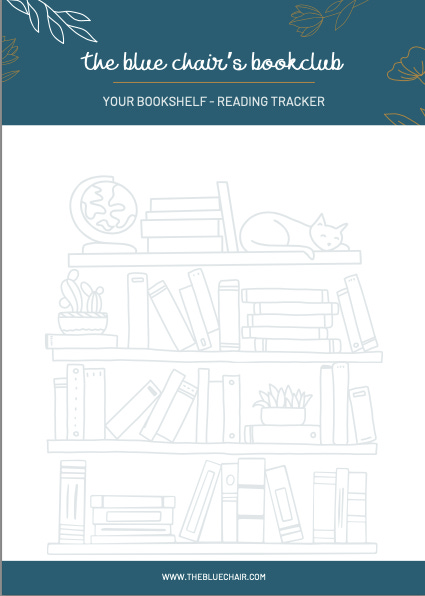
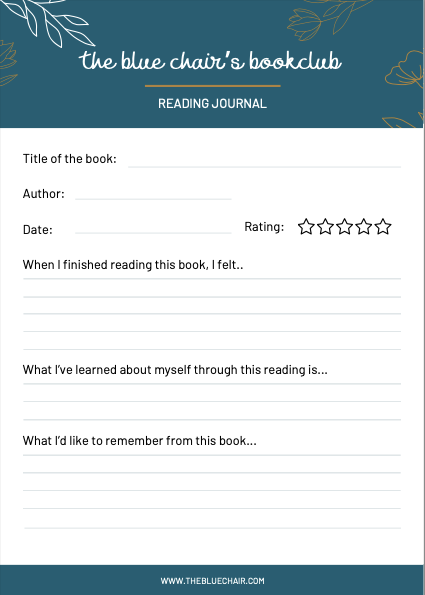
Whether you pick up a novel that breaks you open or a memoir that reflects your own becoming, I hope you let it stay with you. Let it ripple into your days. Let it soften, stir, and shape you.
Reading matters because it’s about what awakens in you when no one else is looking.
That, too, is part of coming home to yourself.
Jessica
Writer, story-lover, and Miha’s creative collaborator weaving the behind-the-scenes threads of the Blue Chair, and sometimes stepping forward to share my own.



